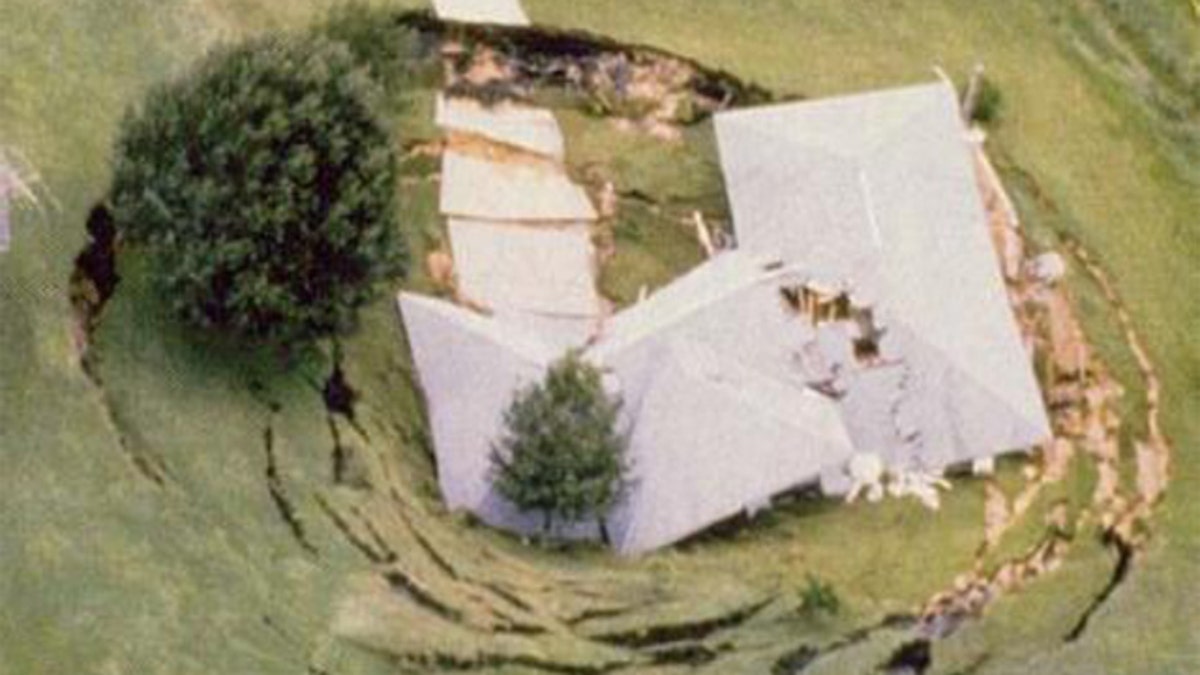
Shown here is an example of a "catastrophic ground cover collapse" sinkhole. (Florida Senate Committee on Banking and Insurance)
Hurricanes and other natural tempests make Florida a risky state for homeowners and insurers alike. But add sinkholes to the mix, and you're looking at an actuary's nightmare.
The number of sinkhole claims in the state -- for reasons that could range from fraud to changing weather patterns -- has skyrocketed over the past few years, a trend that has sapped insurance companies of millions of dollars. Florida lawmakers are now coming to the industry's defense with legislation that would lift a longstanding requirement that they offer sinkhole coverage.
Though their argument is a matter of dispute, the sponsors of the bills say false and misleading claims are behind the sudden increase in sinkhole reporting. According to the Florida Office of Insurance Regulation, the number of claims rose from 2,360 in 2006 to 6,694 last year.
"There's no scientific explanation," said Rep. John Wood, the Republican sponsor of the House bill. "The system creates the opportunity to game the system for anybody ... and it's legal."
Supporters of the legislation say homeowners are attributing minor damage on their property to sinkholes, then using the insurance company payouts for things other than repair, like paying off their mortgage. This has also raised concern that property values could go down as a result. A state Senate Banking and Insurance Committee report released in December said that claims have even been rising in areas not typically subject to sinkholes.
"We don't really have a sinkhole problem in Florida. It seems we have a sinkhole claim problem," Wood said.
The proposals in the legislature would strip a state requirement that insurance companies offer sinkhole coverage at an additional premium. The proposals would still require coverage for "catastrophic ground cover collapse" -- a very rare occurrence in which a sinkhole swallows or destroys the insured property. Plus the proposals would make the government-backed Citizens Property Insurance Corporation provide sinkhole plans, as a last resort.
But Josh Burnett, a Tampa-based attorney with Marshall Thomas Burnett specializing in these kinds of cases, disputed the claim that fraud was to blame for the increase in sinkhole reporting. Rather, he described the legislation as a handout to the insurance industry that would "eviscerate any meaningful sinkhole coverage for any citizen in the state of Florida."
"I would deem it a government bailout of the insurance industry," Burnett said. "It's essentially drafted by the insurance industry for the industry ... not for consumers."
Burnett said there's "potential for fraud" with any insurance claim, but suggested weather patterns, not lying homeowners, are the driver here.
"Geologically, there has been more sinkhole activity over the last few years," he said. Burnett said that any time water is pumped out of one area and into another, that can cause the ground in the area where the water originated to be susceptible to a sinkhole. A sinkhole can occur when the limestone and other material below the surface are hollowed out, typically by water, and cannot bear the weight of the top layer of earth. They can also be triggered by a thin layer of soil on top, which sinks and fills with water.
There have been some alarming instances in the state in just the past few weeks. In late March, a Florida woman fell into a sinkhole in her backyard, then called for help from her cell phone and was rescued. Earlier this month, a well driller was found dead after falling into a sinkhole along with his truck.
The Miami Herald reported that, as the number of claims has risen, so has the number of sinkholes reported to state environmental officials. The Herald also found that the number of related fraud allegations reported to state officials represented just 1 percent of all claims.
But misleading claims are not necessarily fraudulent claims. Wood said current law sometimes allows property owners to claim damage without having a bona fide sinkhole problem.
Regardless of the reason, the costs have piled up. The Office of Insurance Regulation report showed the total cost of the nearly 25,000 claims from 2006 to 2010 reached $1.4 billion. The average payout for a ground cover collapse was close to $150,000. But for more minor sinkhole damage, the average payout was only slightly less.
Sen. Garrett Richter, a sponsor of the sinkhole insurance legislation on the Senate side, said insurance companies are at risk of going under because of the sinkhole claims. Neither bill has yet reached the floor. But Richter said he thinks they stand a chance, as people wrap their heads around the "misleading" sinkhole claims in the state.
"Despite the fact that we haven't had a major category hurricane (in the last few years), Florida has been hit with hurricane sinkhole," he said.




